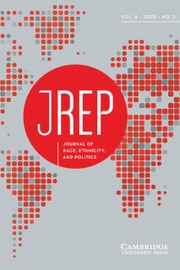No CrossRef data available.
Article contents
Who Buys the “Big Lie”? White Racial Grievance and Confidence in the Fairness of American Elections
Published online by Cambridge University Press: 01 December 2023
Abstract
Election skepticism has become a persistent feature of American politics since the Obama era. Such beliefs are most prevalent among White Americans and especially Republicans, and they are resistant to change. Conspiracy theory studies have shown that such beliefs are linked to feelings of ingroup victimization, at times associated with election loss. We draw on theories of White ingroup processes to argue that White grievance—the belief that Whites are victims of discrimination—is a key correlate of election skepticism among White Americans. White grievance was employed in the Obama era, but it was weaponized by Trump in the 2020 election. Our results based on four national datasets (2012–2020 ANES, 2021 YouGov) show that controlling for negative outgroup attitudes and other factors, White grievance is a significant predictor of election skepticism in all four studies. In 2020, the effect is stronger among White Republicans and independents. We also show that White identity/consciousness has the opposite effect, generally boosting trust in elections. Furthermore, a lagged dependent variable model using the 2016–2020 ANES panel shows that White grievance remains significant even after an LDV is included in the model.
- Type
- Research Article
- Information
- Copyright
- © The Author(s), 2023. Published by Cambridge University Press on behalf of The Race, Ethnicity, and Politics Section of the American Political Science Association




